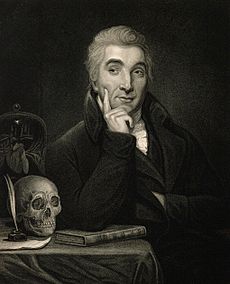John Haighton facts for kids
John Haighton FRS (c. 1755 – 23 March 1823), was an English physician and physiologist.
Biography
Haighton was born in Lancashire about 1755, and, after being a pupil of Mr. Else at St Thomas' Hospital, became a surgeon to the Guards regiments, but resigned on being appointed demonstrator of anatomy at St. Thomas' under Henry Cline. He had already become a skilful surgeon and was so promising an anatomist that the famous surgeon John Hunter had almost concluded an agreement for him to assist him in his lectures. Haighton, however, was not so agreeable and accessible to students as his junior, Astley Paston Cooper, whose developing talent and influence hindered Haighton's advancement. Consequently Haighton resigned his demonstratorship in 1789 and turned his attention to physiology (in which he succeeded a Dr. Skeete as lecturer in 1788 or 1789) and to midwifery, in which he at first lectured in conjunction with a Dr. Lowder. Both these courses were for the united hospitals, St. Thomas's and Guy's. He never succeeded to a physiciancy, though he obtained the degree of M.D. (in 1794 at Kings College, Aberdeen).
He was somewhat suspicious, irritable, and argumentative, but a good lecturer on physiology and an excellent obstetric operator. For his physiological experiments, which were certainly ruthless and numerous, he was called by his opponents "the Merciless Doctor". When Sir Astley Cooper disputed the result of some of Haighton's experiments, the latter killed a favourite spaniel, on which he had previously operated, in order to prove Sir Astley in the wrong. He often presided at the meetings of the Physical Society at Guy's Hospital, was joint editor of Medical Records and Researches (T. Cox, 1798), and assisted Dr. William Saunders (1743-1817) in his Treatise on the Liver (1793). The silver medal of the Medical Society of London for 1790 was adjudged to him for his paper on Deafness.
In later years he suffered much from asthma, and his nephew. Dr. James Blundell, began to assist him in his lectures in 1814, and took the entire course from 1818. In 1810, Haighton was elected as a member of the American Philosophical Society in Philadelphia. He was also elected a Fellow of the Royal Society in 1815.
He died on 23 March 1823. Blundell describes him as kind-hearted, generous, and scrupulously truthful, and a cautious and able physician. Dr. Blundell's nephew, Dr. G. A. Wilks of Torquay, has a good portrait of Haighton.


